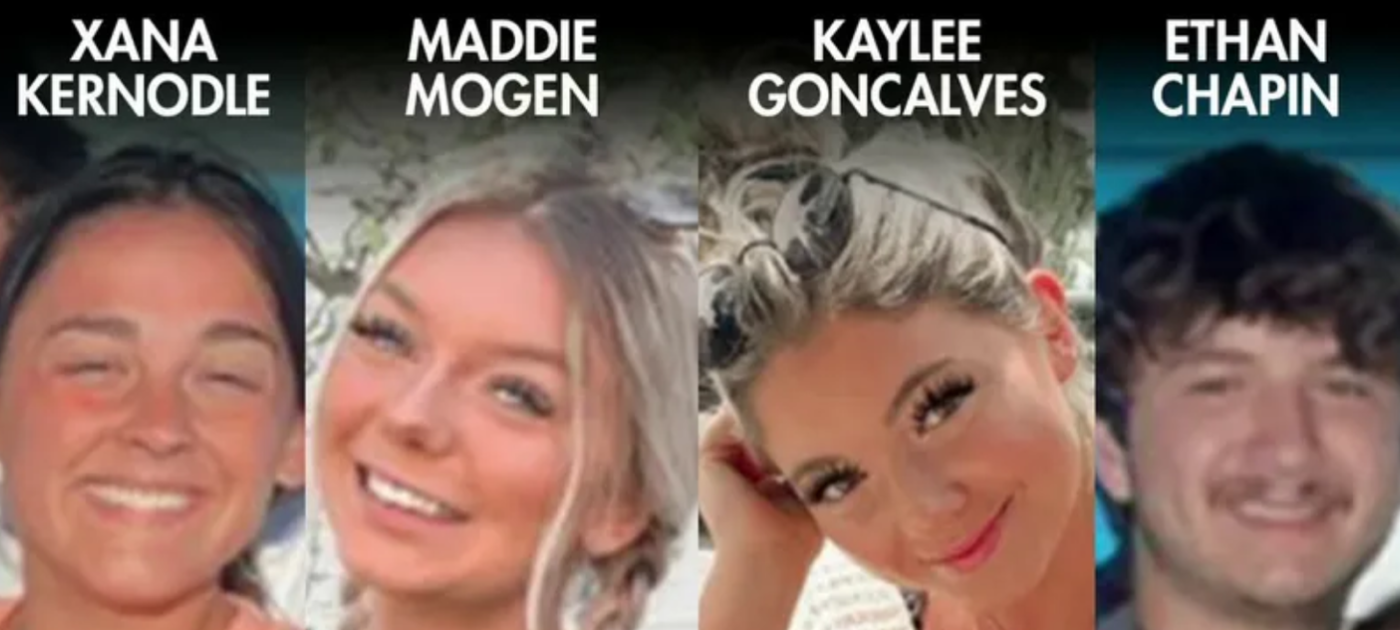With the latest developments in the violent quadruple homicide of four Idaho University students, the topic of how sophisticated criminals understand and experience their own behavior is heavily discussed.

“Behavior reflects personality. The best indicator of future violence is past violence. To understand the ‘artist,’ you must study his ‘art.’ The crime must be evaluated in its totality. There is no substitute for experience, and if you want to understand the criminal mind, you must go directly to the source to learn to decipher what he tells you. And, above all else: Why + How = Who.”
Many things stand out from this introduction, but for anyone closely following developments in a high profile case, it’s the middle part that bears repeating.
“There is no substitute for experience, and if you want to understand the criminal mind, you must go directly to the source to learn to decipher what he tells you.”
Taken out of academic context, this is a chilling statement. It’s easy to see how someone with a deluded mind could misinterpret this conceptual sentiment considering there are endless ways to get to “the source.”
For decades, prolific killers have been sensationalized and plastered across all media channels. It’s journalistic routine to name a killer, and give them valuable airtime by sharing their manifestos, social media posts, and dissecting their every move.
It’s because of this that it’s been easier than ever for criminals to study other criminals at “the source.” Many have been profiled, had documentaries made about them, or books written on their behalf. But, just because this information is accessible doesn’t mean that everyone falling down the rabbit hole has malicious intent.
What separates the researchers and academics from the dysregulated offenders? Why do some notorious offenders have educational backgrounds in criminal justice, psychology, or criminology?
Before diving in, let’s address the ‘elephant’ in the news.
On Friday, December 30, 2022, a suspect was arrested in the November 13th University of Idaho, Moscow, killings of Kaylee Gonvalves, 21; Madison Mogen, 21; Xana Kernodle, 20; and Ethan Chapin, 20.

 The suspect is 28-year-old Bryan Christopher Kohberger. The FBI homed in on him as a suspect through DNA evidence and his confirmed ownership of a white Hyundai Elantra seen near the crime scene. Authorities say he lived just minutes from the Moscow home.
The suspect is 28-year-old Bryan Christopher Kohberger. The FBI homed in on him as a suspect through DNA evidence and his confirmed ownership of a white Hyundai Elantra seen near the crime scene. Authorities say he lived just minutes from the Moscow home.
The suspect is a Ph.D. student in Washington State University’s Department of Criminal Justice and Criminology. In 2018, he received a bachelor’s degree in psychology and a master’s degree in criminal justice from DeSales University in Pennsylvania. While studying for his undergraduate degree, he spent years as a part-time school security officer in the Peasant Valley School District.
A former DeSales University professor who taught the suspect said he was “one of my best students, ever” — and that the then-master’s candidate was one of only two students she has ever recommended to a Ph.D. program. She added that he was “brilliant” and a “great writer,” providing more context to his ability to understand the justice system and criminal mind.
Nick McLoughlin, who knew the suspect in high school, told The Daily Beast that “He always wanted to fight somebody” and that the suspect was taking criminal justice courses because he was thinking of becoming a police officer.
While in his doctorate program, the suspect had posted a survey online asking for former felons to participate in a research project that sought to “understand how emotions and psychological traits influence decision-making when committing a crime.”
Questions in the public survey aimed to get to the deepest corners of the criminal mind, asking former offenders how they approached or targeted their victims, probing for how they prepared for the crime, and quizzing how they traveled to and entered the location of the crime.
“Please detail what you were thinking or feeling,” was explicitly asked multiple times.
In the context of a criminology degree, the survey is perfectly normal. However, the macabre nature is unveiled in light of his arrest for one of the most brutal quadruple homicides in recent years.
The #Idaho4 suspect isn’t the only offender who closely studied criminals and related topics.
Notorious Criminals who Studied Criminals
“To understand the ‘artist,’ you must study his ‘art.’”
Some infamous offenders have an academic background in forensic areas of study, while others were infatuated with being in law enforcement or had a badge themselves.
 Serial killer Ted Bundy graduated in 1972 from the University of Washington with a degree in psychology — just two years before he took the life of his first victim, 18-year-old Karen Sparks in January of 1974. Later that same year, Bundy went to law school at the University of Utah. Soon after that, the murders never stopped until he was arrested.
Serial killer Ted Bundy graduated in 1972 from the University of Washington with a degree in psychology — just two years before he took the life of his first victim, 18-year-old Karen Sparks in January of 1974. Later that same year, Bundy went to law school at the University of Utah. Soon after that, the murders never stopped until he was arrested.
Bundy was known for being an avid reader of “True Detective” magazines that detail horrific true stories of gruesome cases in a sexualized style. He says his early consumption of the magazine and their drawings of abused females in crime stories manipulated his view of women and stoked violent fantasies.
Edmund Kemper, the “Co-ed Killer,” desperately wanted to be a police officer, but was rejected from the force. Kemper claims he was rejected because he had a monstrous 6’9” frame, but he also killed his grandparents when he was just a teenager. As an adult, he was friendly with Santa Cruz police officers who would frequently spill investigative details of the murders he committed, not knowing they were talking to the killer himself.
Dennis Rader, the infamous “Bind, Torture, Kill (BTK)” offender, graduated with a bachelor’s in Criminal Justice from Wichita State University. While there in the 1970s, he used his college courses to study his own ongoing murder investigations and get access to law enforcement information, according to his daughter, Kerri Rawson.
Joseph DeAngelo, the “Golden State Killer,” worked as a police officer in the mid-to-late 1970s in California. He used his extensive knowledge as an officer to exploit the lack of communication between jurisdiction systems. DeAngelo also used his experience catching killers to help curate his methodology for breaking into people’s homes undetected.
Researchers vs. Dysregulated Offenders
“if you want to understand the criminal mind, you must go directly to the source to learn to decipher what he tells you.”
What separates researchers and academics from the dysregulated offenders studying criminals is that it’s exceedingly rare that anyone uses the knowledge for the wrong reasons. The near-total majority use their newfound expertise to become advocates, to work within the system, or to help others.
Retired NYPD detective sergeant Joseph Giacalone has done just that with this criminology background. While currently teaching at New York City’s John Jay College of Criminal Justice and writing textbooks on how to conduct criminal investigations, he says he’s commonly asked: “Are you worried about making better criminals?”
To that, Giacalone told The Daily Beast, “It’s always a concern, you always have that in the back of your mind.” Ultimately, Giacalone knows he’s helping new investigators prevent further victimization.
Famed forensic psychologist and serial killer expert Katherine Ramsland must surely be wrestling with the same worries about creating sophisticated offenders, considering it was revealed that the Idaho suspected killer studied under her while at DeSales University.
Dr. Ramsland teaches courses like “Psychology of Death Investigations” and has written 68 books, including How to Catch a Killer and Confession of a Serial Killer: The Untold Stories of Dennis Rader.
But, to put that into perspective, Dr. Ramsland has had thousands of students over the course of her teaching career — as have the other thousands of criminology and forensic psychology professors around the country. It is incredibly uncommon for any of the students to end up as violent offenders.
What also separates the academics from the future offenders studying criminals is the ultimate goal of the student. A healthy person studying criminology won’t “turn into” an offender because of the content they examine, nor will a slightly troubled individual have a switch in their brain flipped and turn into Dexter.
The dysregulated offenders studying criminals are the 1% of the 1%.
So, why do some criminals study other criminals?
The answer is possibly quite simple…everyone wants to understand themselves, and no one wants to feel alone.
“Who am I?” Is one of the most complex questions to answer for someone who is struggling to find their way, or for someone who doesn’t understand the thoughts they’re having. A person at risk of going down the wrong path might gravitate towards darker areas of study because trying to understand themself is a source of comfort.
In a dark and more twisted view, some individuals may have violent thoughts, so their academic or amateur research is more cathartic rather than an expedition to understand. Criminals can also study other criminals to learn from their mistakes for future offenses, almost like peer-reviewing methodology.
Alternatively, some people study other criminals to cry out for help. They may want to stop themselves from becoming violent in the future.
Ultimately, what matters most is that these areas of study exist to help experts catch these offenders, not create them. John Douglas’s simple formula has been designed to do just that…and the formula continues to work, just as it has for the murders of Xana, Maddie, Kaylee, and Ethan.
“…Above all else: Why + How = Who.”
Additional Reading: Do the Idaho Killings Resemble Notorious College Massacres?
While naming offenders and discussing their crimes is a complex and challenging topic, the benefits of being educated indicate that this is a meaningful conversation. We are only naming offenders in the context of the study, never to glorify their behavior.
Andrea Cipriano is a Case Researcher and Content Specialist at Uncovered, where she writes for the twice-weekly true crime newsletter, The Citizen Detective. Andrea graduated with a Master of Arts in Forensic Psychology from John Jay College of Criminal Justice where she focused on researching and peeling back the criminal mind. Andrea believes that it’s never too late for justice.
